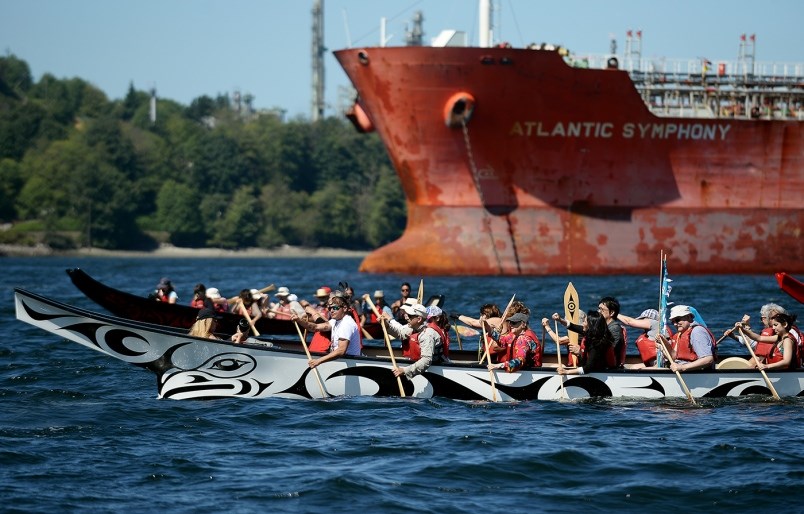NOTE: This story has been updated. To see the latest version, click here.
The federal court of appeal has delivered a massive victory to the Tsleil-Waututh and Squamish First Nations in their challenge of the Kinder Morgan pipeline expansion, ruling this morning that the federal government failed to adequately consult with them on the Kinder Morgan expansion.
In a unanimous decision by a panel of three judges, the court says the National Energy Board's review of the project was so flawed that the federal government could not rely on it as a basis for its decision to approve the expansion.
The court concluded the federal government failed in its duty to engage in meaningful consultations with First Nations before giving the green light to the project, approved by the Liberal government in 2016.
The court also ruled that the federal review was also flawed in that it excluded the project's impact on marine shipping and did not assess the potential impact of increased tanker traffic on the southern resident killer whale population.
The federal government announced plans this spring to buy the pipeline and expansion project for $4.5 billion.
The court decision means that federal approvals of the pipeline project are essentially quashed until the issues of consulting First Nations are adequately addressed.
Squamish and Tsleil-Waututh leaders will hold a press conference in North Vancouver to share their reaction to the decision later this morning.
Both North Shore First Nations have been adamantly opposed to the pipeline project, and have criticized the federal government for not adequately consulting them.
Khelsilem, spokesman for the Squamish Nation council, said earlier this year that Prime Minister Justin Trudeau has "completely failed" to honour promises he made to First Nations during the last federal election campaign.
In its written ruling, justices of the federal court noted that meaningful consultation is not intended simply to allow indigenous peoples “’to blow off steam’” before the Crown proceeds to do what it always intended to do.
But the court found that is essentially what happened in Canada’s meetings with local First Nations.
“The meeting notes show little or no meaningful responses from the Crown consultation team to the concerns of the indigenous applicants. Instead, too often Canada’s response was to acknowledge the concerns and to provide assurance the concerns would be communicated to the decision-makers,” the court noted.
In contrast, “meaningful dialogue required someone representing Canada empowered to do more than take notes — someone able to respond meaningfully to the applicants’ concerns at some point in time.”
The court further ruled the national energy board had “unjustifiably defined the scope of the project under review not to include project-related tanker traffic. The unjustified exclusion of marine shipping from the scope of the project led to successive, unacceptable deficiencies in the board’s report and recommendations.”
As a result, the government could not rely on the report of the National Energy Board and its recommendations when assessing the pipeline project’s environmental effects and overall public interest, the court ruled.
The expansion would triple the capacity of the Trans Mountain pipeline from near Edmonton to Burnaby, B.C., to 890,000 barrels a day. It would also increase the number of tankers in Burrard Inlet seven-fold.
- with files from Canadian Press
*This story will be updated throughout the day with reaction to the decision.



